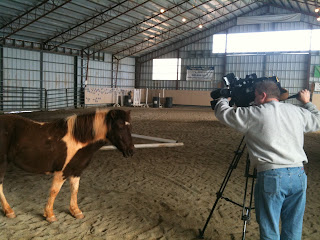 |
| Bonding with Coco |
This is one of those times when it's frustrating to be a television reporter, where all stories are measured in time. To be clear, my segments on the Fox Ten o'clock News are longer than most, but this story, of how horses help people with emotional problems, required even more time to tell properly.
Thankfully, there is the internet with what we call a, "bottomless news hole." That means I can write as much as I want and never run out of space. You may run out of interest, but I will never reach the bottom of the page.
 | |
| Michelle Holling-Brooks and crew. |
I hope the meaning in this story comes through on the air, but here's my attempt to explain the thing about horses as opposed to say, a human therapist or other problem solving approaches to therapy.
Michelle Holling-Brooks was very patient with me as I asked her how horses help people. Since I didn't feel I needed any help in particular, but was about to carry out the exercise that her clients go through, I wanted to know why the horse made a difference.
She had made a triangle in the middle of the indoor riding ring. My job was to get a pony named Coco to go stand in the middle of the triangle. I could use anything nearby to get Coco to do this.
 |
| Coco poses for Fox Photographer Curt Schruth |
In order to do what Michelle wanted, I needed to form a relationship with the horse -- to try different approaches until something worked. And here is the key, horses are not like dogs. You want a dog to come, you say "come." You clap your hands, act excited, get on your hands and knees and the dog will come to you. A horse will think you are nuts.
Horses live in the moment. If you do the right thing, at the right moment, you can persuade a horse to do what you want. But here's something else about horses, if you don't REALLY want it -- if you are not REALLY paying attention to that horse, it will not acknowledge your request. It will put its head down and pretend to be eating. Trust me. Horses know what you're thinking. I learned this.
Here's the human part. Many of Michelle's clients have a hard time forming relationships with people. They might be an abused woman, a victim of child abuse, or a vet suffering from post traumatic stress disorder. They need to learn to form relationships. Unlike humans, the horse will not judge their character -- only their sincerity. And if Coco is any proof, horses know when a person is being sincere.
I asked Michelle on camera to give me the best example of how a horse helped someone. The answer was too long for the TV story -- but not the bottomless news hole.
"We had a client who was a girl in a residential treatment home. She didn’t believe anyone wanted her. She didn’t think she deserved love. At times people
had to restrain her. A family wanted to adopt her, but she was sabotaging adoption," Michelle told me.
"And she at that moment collapsed into the horse, put her arms around it and just started sobbing and crying....
Frustration set in as the girl tried and failed to get the horse to do what she wanted. She ranted and circled the horse at a distance, yelling at it. The horse seemed to understand that she was angry at the world not with him. The horse moved closer until he was chest to chest with the girl.
Michelle picks the story up from there: "And she at that moment collapsed into
the horse, put her arms around it and just started sobbing and crying. And they stood that way for a while
until eventually her legs buckled and he just lowered her to the ground, and
they stood there at the ground for what seemed like forever, and the (other) therapist
was like, 'oh I’m going in…' and I said, 'no, just wait the horse is doing his
job.' After a few minutes, the
horse picked his head back up, her arms were still linked over the horses head,
so it picked her up. And she was
talking to the horse…. Her arms fell gently to her side and she looked over at
us and said, 'He didn’t leave. No
matter what I did he didn’t leave me.'
The girl was adopted and went on to college. There were certainly other forces guiding her success, but horse therapy was one of them.
 | |
| Red was another pony. |
Back to Coco and me. I finally figured out how to get Coco to go to the triangle. (see the news story for details) But one time, Coco suddenly walked away. Michelle asked me, "Did you just have a change of thought? Maybe wondering what to do next for your story? In fact, I had. "Coco knew," she said. "You stopped thinking about Coco, so she left."
I challenged her. I said it was a pure coincidence. "No," Michelle patiently explained. "We do this all day every day. I see it all the time. That is the magic of horses."
 |
| An exterior shot of the heated indoor ring outside Boones Mill. |
If you want to learn more about Unbridled Change, I encourage you to look at their website. Michelle, as the founder and executive director is still a volunteer. There are some paid counselors and several other volunteers, but like most not-for-profits, they need donations to survive. Please give them a look and consideration when you are writing check to charity.

No comments:
Post a Comment